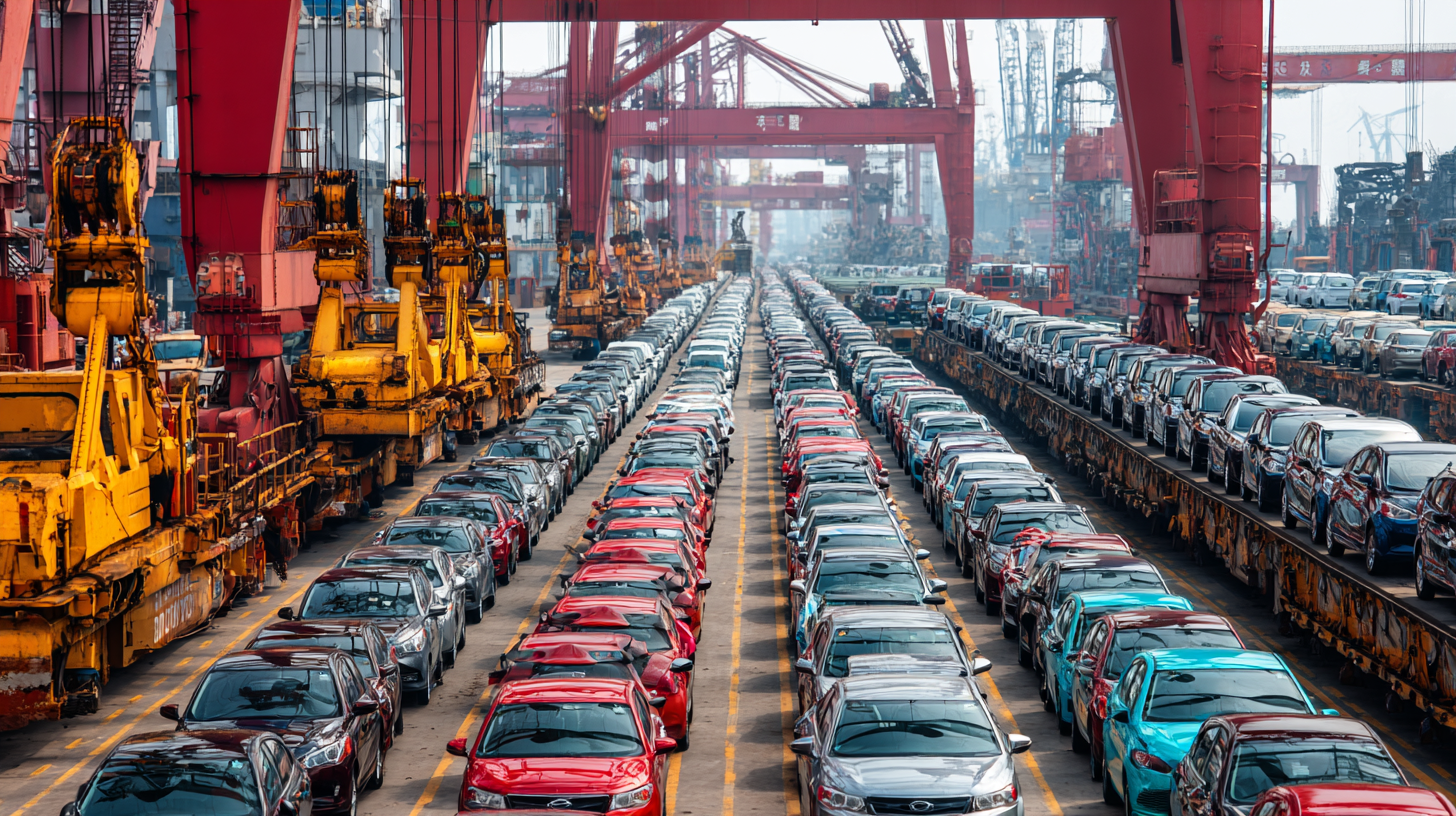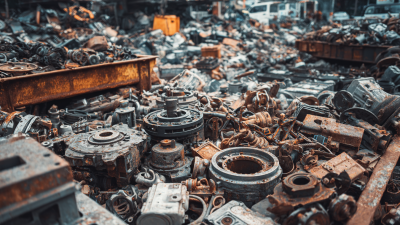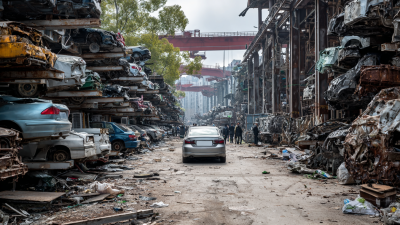Blog
Innovating Auto Recycling Strategies at the 138th Canton Fair 2025 Insights and Industry Data
As the global automotive industry faces increasing pressure to adopt sustainable practices, the focus on auto recycling has become more prominent than ever. The 138th Canton Fair in 2025 serves as a pivotal platform for showcasing innovative strategies aimed at transforming auto recycling processes. According to a report by the International Bureau of Automotive Recycling, the global auto recycling market is projected to reach USD 75 billion by 2027, growing at a CAGR of 6.6%. This growth is fueled by advancements in recycling technologies and stringent environmental regulations that promote the reuse of automotive materials.
 The Canton Fair is anticipated to play a critical role in facilitating collaborations and knowledge-sharing among industry players, highlighting emerging trends and best practices in auto recycling. By leveraging insights from this premier event, stakeholders can better navigate the complexities of the auto recycling landscape and contribute to a circular economy in the automotive sector.
The Canton Fair is anticipated to play a critical role in facilitating collaborations and knowledge-sharing among industry players, highlighting emerging trends and best practices in auto recycling. By leveraging insights from this premier event, stakeholders can better navigate the complexities of the auto recycling landscape and contribute to a circular economy in the automotive sector.
Innovative Approaches to Auto Recycling: Key Trends from the 138th Canton Fair 2025
At the 138th Canton Fair in 2025, the automotive recycling sector showcased a range of innovative approaches designed to enhance sustainability and efficiency. Among the key trends was the emphasis on advanced technology integration in recycling processes. Companies presented solutions utilizing artificial intelligence and robotics to automate the dismantling of end-of-life vehicles, significantly reducing labor costs and improving safety measures. This shift towards automation not only streamlines operations but also ensures higher recovery rates of valuable materials.
Another notable trend was the development of closed-loop recycling systems, which promote the reuse of materials in the production of new vehicles. Industry leaders highlighted partnerships with manufacturers to create a seamless integration of recycled components, thereby minimizing waste and reducing the carbon footprint of the automotive industry. Moreover, these collaborations aim to foster a circular economy, where materials are continually repurposed, leading to long-term sustainability objectives. Overall, the insights garnered from the fair underscore the automotive sector's commitment to innovative recycling strategies that address environmental concerns while supporting economic growth.
Innovative Approaches to Auto Recycling: Key Trends from the 138th Canton Fair 2025
Analysis of Global Auto Recycling Market Growth Projections for 2025
The global auto recycling market is anticipated to witness significant growth by 2025, driven by increasing environmental regulations and the rising demand for sustainable practices within the automotive industry. Innovations in recycling technologies and processes are expected to enhance the recovery of materials, such as metals and plastics, from end-of-life vehicles. As manufacturers and consumers alike seek to minimize their ecological footprints, the auto recycling sector is poised to become a critical component of circular economy frameworks.

In addition, various regional markets are adapting to these changes, with emerging economies ramping up efforts to establish effective recycling infrastructures. The 138th Canton Fair serves as a pivotal platform for industry stakeholders to share insights, showcase innovative solutions, and forge partnerships aimed at tackling the challenges of automotive waste. As data reveals robust growth projections, the convergence of technology and policy will likely reshape the landscape of auto recycling, ensuring that it aligns with global sustainability goals while meeting the evolving needs of the automotive sector.
Technologies Driving Efficiency in Auto Recycling at the Canton Fair 2025
The 138th Canton Fair in 2025 is set to showcase groundbreaking technologies that are transforming the auto recycling industry. With an increasing focus on sustainable practices, companies are leveraging innovative equipment and processes to enhance efficiency in recycling vehicles. Advances in automation and artificial intelligence are streamlining the dismantling process, allowing for quicker and more precise extraction of valuable components.
Additionally, the integration of advanced sorting technologies is enabling recyclers to separate materials with greater accuracy, maximizing the recovery of metals, plastics, and other recyclable substances. These technologies not only reduce waste but also lower operational costs, making auto recycling a more economically viable option for businesses. The Canton Fair serves as a platform for industry leaders to share insights, demonstrate new tools, and collaborate on strategies that push the boundaries of what is possible in auto recycling.

Sustainable Practices in Auto Recycling: Insights from Industry Leaders at the Fair
At the 138th Canton Fair 2025, industry leaders gathered to exchange insights on sustainable practices in auto recycling, highlighting the pivotal role of innovative strategies in transforming the sector. According to a recent report by the Global Automotive Recycling Council, approximately 95% of end-of-life vehicles can be recycled, but only about 75% of materials are typically recovered in conventional processes. This indicates a significant opportunity for improvement through advanced recycling technologies and methodologies.
Experts at the fair discussed novel approaches that prioritize environmental sustainability while maximizing resource recovery. For instance, the introduction of automated dismantling systems can enhance the efficiency of material recovery, potentially increasing the recycling rate by up to 20%. Additionally, the use of biocompatible materials in vehicle manufacturing could lead to a reduction in hazardous waste, aligning with global sustainability goals. As the automotive industry braces for stricter regulations and rising consumer demands for eco-friendly practices, fostering collaboration among stakeholders is vital to drive these necessary innovations.
Impact of Legislative Changes on Auto Recycling Strategies Presented at the Canton Fair 2025
At the 138th Canton Fair in 2025, significant shifts in the legislative landscape surrounding auto recycling will be a focal point for industry stakeholders. Recent reports indicate that over 50% of the automotive sector is bracing for new regulations that prioritize sustainability and circular economy principles. The introduction of stringent recycling quotas and incentives for eco-friendly practices highlights the urgent need for innovative auto recycling strategies. According to a study by the International Recycling Bureau, the global auto recycling market is expected to grow by 8% annually, driven largely by these legislative changes.
As manufacturers and recyclers adapt to this new regulatory environment, they are increasingly turning to advanced technologies to enhance efficiency and reduce waste. For instance, the implementation of AI-driven sorting systems can improve the separation of materials, thereby increasing the recovery rates of valuable components. Industry experts predict that in response to these legislative changes, the recycling rate for end-of-life vehicles could reach 95% by 2030, up from the current 80% threshold. This evolution not only aligns with governmental objectives but also fosters a sustainable approach that benefits the entire automotive supply chain, reinforcing the industry's commitment to environmental responsibility.
Related Posts
Logel’s Auto Parts
116 Bridge St East
Kitchener, Ontario
N2K 1J6
Phone: 519-745-4751
Toll Free: 1-800-818-9118
Hours 8:00-5:00 Monday to Friday
At Logel’s Auto Parts, we serve a range of communities in Southern Ontario, including:






